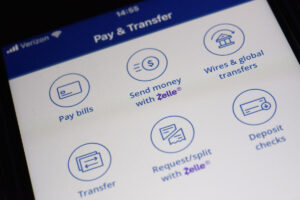—
### Federal Lawsuit Targets Major Banks Over Zelle Fraud: What Investors Need to Know
In a significant development affecting consumers and investors alike, the Consumer Financial Protection Bureau (CFPB) has taken legal action against banking giants JPMorgan Chase, Wells Fargo, and Bank of America. The complaint alleges that these institutions failed to safeguard their customers against rampant fraud occurring on the widely-used payment platform, Zelle. This lawsuit raises critical issues surrounding consumer protection in financial technology, particularly as it relates to peer-to-peer payment systems.
The CFPB’s civil complaint outlines a disturbing narrative: the banks launched Zelle rapidly, prioritizing market readiness over consumer security. As fraud incidents surged, customers turned to their banks for support, only to face significant challenges in obtaining relief. The agency argues that the banks largely neglected their responsibilities to investigate and address these issues in a timely manner, as required by federal consumer financial laws.
#### The Allegations of Negligence
According to the CFPB, shortly following Zelle’s launch, alarming levels of fraud became evident. Yet, the banks failed to implement effective measures to mitigate these fraud risks for years. This negligence not only undermines consumer trust but also draws attention to the potential risk exposure for investors in these financial institutions.
The CFPB claims the banks’ actions may have violated laws governing electronic fund transfers. These laws obligate banks to conduct “reasonable investigations” when customers report transaction problems. The lawsuit also highlights the banks’ failure to take adequate steps to prevent and address fraud, which adds another layer of complexity to the regulatory landscape surrounding payment platforms.
The financial impact is considerable; the CFPB reported that customers of the implicated banks have lost over $870 million due to these failures since Zelle’s inception. This figure is alarming and raises questions about the overall risk management practices at these institutions, demonstrating a potential liability that could impact shareholder value.
#### Early Warning Services Also in the Crosshairs
Adding another layer to the lawsuit, Early Warning Services (EWS)—the fintech company that operates Zelle—has also been named as a defendant. Owned by several major banks, including JPMorgan, Wells Fargo, and Bank of America, EWS controls a significant portion of Zelle’s infrastructure. Together, these banks accounted for an impressive 73% of the payment activity on Zelle last year.
EWS defended itself by stating that Zelle employs robust measures to combat fraud and scams. However, the allegations reflect a critical moment of introspection for the financial industry, calling into question the efficacy and reliability of existing fraud prevention frameworks.
#### Bank Responses and Implications
In response to the lawsuit, Bank of America has expressed strong disagreement, arguing that the legal action could impose “huge new costs” on banks and credit unions offering the Zelle service free to consumers. The institution contends that over 99.95% of Zelle transactions proceed without incident, emphasizing its commitment to resolving customer issues directly.
JPMorgan, on its part, criticized the CFPB for allegedly overstepping its authority by holding banks accountable for criminal behavior committed by third parties. Wells Fargo has chosen to remain tight-lipped, neither confirming nor denying any details related to the lawsuit, indicating a cautious approach.
#### The Bigger Picture for Investors
As Zelle continues to dominate the peer-to-peer payment landscape—with over 143 million users transferring a staggering $481 billion in just the first half of 2024—investors need to be vigilant about the implications of this lawsuit. The potential legal and financial repercussions could significantly affect these banks’ operational practices and market positioning.
Moreover, as digital payment systems become more integral to everyday transactions, issues surrounding consumer protection and fraud prevention will likely gain increasing regulatory scrutiny. Investors should keep a close eye on how these banking institutions respond to this lawsuit, as it may signal broader trends in compliance and consumer rights within the financial technology sector.
In summary, the lawsuit against JPMorgan, Wells Fargo, and Bank of America serves as a critical reminder of the importance of consumer protection in finance. As the landscape evolves, investors must be proactive in understanding these dynamics to make informed decisions.
—

